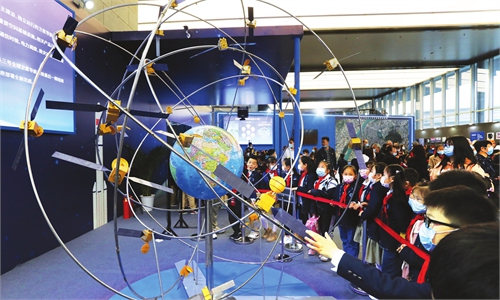
People visit the first International Summit on BeiDou Navigation Satellite System (BDS) Applications, in Changsha, central China's Hunan Province, Sept. 16, 2021. The First International Summit on BDS Applications opened Thursday with the theme "BDS serves the world, application fuels the future." Photo:Xinhua
The average number of active users of China's BeiDou Navigation Satellite System (BDS) reached 40.3 million per day in the first half of this year, and the system was used 320 million times per day, Xu Wenli, an official from the Ministry of Industry and Information Technology, said on Tuesday.
Xu said that the scale of applications continues to expand, citing data showing that the number of domestic BDS high-precision shared bicycles has exceeded 5 million. More than 1 million trucks used the system in the first half of 2022.
Also in the first half, 128 new mobile phone models supporting the BDS were sold, with a total shipment of 132 million units, accounting for 98.5 percent of the shipments.
China continuously improves the BDS industry chain, expands applications in the mass consumption field and has achieved positive results, Xu said.
China will continue to promote the integration and innovation of BDS and 5G, the Internet of Things, Internet of Vehicles, satellite internet and other new technologies, he noted.
The China-developed BDS, which has also served global users for more than two years, has been deeply integrated into and applied in industries such as transportation, disaster prevention and mitigation, agriculture, forestry, animal husbandry and fishing, and power and communication.
ASEAN members, as China's close neighbors, will be given priority to BeiDou precision space-time services with higher accuracy, reliability and variety, Yang Changfeng, BeiDou's chief designer, said at a forum in Nanning, South China's Guangxi Zhuang Autonomous Region on Saturday, according to a report on chinanews.com.cn.
The report said that Guangxi has built 13 BDS navigation application demonstration and industrialization projects for ASEAN, and the China-ASEAN cross-border geological disaster monitoring system has been applied in Cambodia, Laos, Thailand, Malaysia and Myanmar.
The National Development and Reform Commission (NDRC) said in April that the value of BDS exceeded 400 billion yuan ($57 billion) as of the end of the 13th Five-Year Plan (2016-20) period.
At the end of 2021, there were more than 1 billion units and terminals using the BDS positioning function nationwide, NDRC said.
On July 31, 2020, China officially commissioned the BDS, opening the new BDS-3 system to global users.
There are 45 BDS satellites in orbit and they have formed a relatively complete service capability as well as a mature industry system with a primary application scale and a fair global market share, according to the official.
BDS is China's largest space-based system and one of four global navigation networks alongside the US' GPS, Russia's GLONASS and the EU's Galileo.
Global Times


